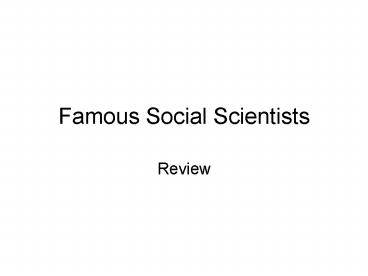Famous Social Scientists PowerPoint PPT Presentation
Title: Famous Social Scientists
1
Famous Social Scientists
- Review
2
Piaget
- Stages of Cognitive Development
- Sensorimotor (birth ? 2)
- Object permanence
- Direct sensory experience
- Preoperational (2 ? 7)
- Simple symbols
- Egocentric
- Concrete Operational (7 ? 11)
- Conservation/Complex Operations
- See others point of view
- Formal Operational (12 ?)
- Abstract thought
- Use of logic and evidence
3
Freud
Superego
Id
Ego
- Defense Mechanisms
- Deny/distort reality
- Act unconsciously
4
Freud
http//www.discunlimited.com/images/company_assets
/512f1c7f-0d64-4a5e-9d91-785dc064755f/Image/Resear
ch/FreudsIcebergModel.bmp
5
Freud
- Id pleasure principle - innate
- Ego reality principle - learned
- Superego conscience - learned
- If Ego cant maintain balance between Id and
Superego, then defense mechanisms - Psychoanalysis
- dream analysis, hypnosis and free associations
- reveal unconscious
6
Freud
- Stages of Psychosexual Development
- Oral Stage (0-1 year)
- Anal Stage (1-3 years)
- Phallic Stage (3-5/6 years)
- Latency Period (5/6 puberty)
- Genital Stage (puberty maturity)
- The events of psychosexual development may lead
to fixations later on in adult life
7
Jung
- Unconscious split into individual and collective
- Individual Unconscious
- contains selfish drives and individual experience
- Collective Unconscious
- Archetypes common to all
- Two personality types
- Extrovert desire and interest directed to
others - Introvert desire and interest directed to self
http//www.jungneworleans.org/images/JungMandalaLa
rge.jpg
8
Maslow
- Theory of motivation Hierarchy of Human Needs
- Needs range from low (food and water) to high
(self actualization) - Lower needs must be met before higher ones
http//upload.wikimedia.org/wikipedia/commons/thum
b/5/58/Maslow27s_hierarchy_of_needs.svg/800px-Mas
low27s_hierarchy_of_needs.svg.png
9
Erikson
- Focused on child development
- Concerned with identity crises
- Contributed eight stages of life
- Each stage offers a crisis that must be resolved
- Success at later stages depends on ability to
resolve earlier crises - Overcoming crises successfully leads to healthy
personality development - Inability to resolve crises can lead to unhealthy
development - Personality develops through lifetime
- Expands on Freuds infancy theories
- Extends development to late adulthood
10
Adler
- motivating force is sense of inferiority
- People strive for perfection
- People try to overcome with compensation
- Striving towards perfection or superiority
- Compensation can be too great (overcompensation
superiority complex) - Birth Order can influence personality
http//cheekygen.blogspot.com/2008/06/birth-order-
and-siblings-rivalry.html
11
Sheldon
- Behavior explained by body type
- Endomorph round
- Mesomorph muscular
- Ectomorph thin
- Temperament is related to body type
- Somatotypes
http//www.umsl.edu/keelr/pics/somato3.jpg
12
Kohlberg
- Piaget found 2 stages of moral thought
- moral realism concern with consequences
- moral autonomy concern with reasons
- Morality motivates behavior
- Extended Piagets 2 stages to 6
LEVEL STAGE SOCIAL ORIENTATION
Pre-conventional 1 Obedience and Punishment
2 Individualism
Conventional 3 Good boy/girl
4 Law and Order
Post-conventional 5 Social Contract
6 Principled Conscience
13
Gilligan
- Responded to Piaget and Kohlberg
- Almost exclusively researched males
- Found different moral perspectives among genders
- Male Justice orientation rights, principles,
rules, - Female Care orientation concern, sensitivity,
- Preconventional stage individual survival
- Transition from selfishness to responsibility for
others - Conventional Stage self sacrifice
- Transition from goodness to truth
- Postconventional - nonviolence
14
Marx
- Motivation by economic conditions
- Economic conditions affect other social
structures (religion, politics, art,) - Wrote Communist Manifesto
- Outlined struggle in which proletariat is
exploited by bourgeoisie class struggle - Proletariat sells labour to owner, who enjoy
surplus value - Proletariat large group of working class
- Bourgeoisie small group of owners
- Suggested revolution by working class and
ultimately a classless society
15
Durkheim
- Emphasis on social structure
- Society (exterior to individual) can explain
social behavior - Social stability found in common religion and
morality - Loss leads to confusion (Anomie)
- Explained suicide as result of anomie, over
association, or under association - Strong social ties tend to reduce likelihood of
suicide - Excessive social ties can increase the likelihood
of suicide
16
Weber
- Reaction to Marx
- Motivation not by economic condition but meaning
(religion) - Examined relationship between religion and
economy - Found capitalism thrives under western religions
(but not eastern) Protestant work ethic - Study of social structures alone cannot explain
human behavior - Study of Sociology must be a mix of
interpretation and experience

